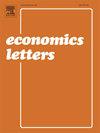Diverging opinions on standardized testing: A survey-based approach
IF 2.1
4区 经济学
Q2 ECONOMICS
引用次数: 0
Abstract
We collect micro-level sentiment data on standardized testing for college admissions from undergraduate students and faculty at an R1 institution in the United States. Our findings reveal a notable disparity: students place 23% less weight on standardized tests in the admissions process compared to faculty. Furthermore, in contrast to students’ perceptions, faculty opinions align with Chetty et al. (2023) as they view the standardized tests as a reliable predictor of both academic performance and post-college success.
关于标准化考试的分歧意见:基于调查的方法
我们收集了美国一所R1机构的本科生和教师在大学入学标准化考试中的微观情绪数据。我们的研究结果揭示了一个显著的差异:在录取过程中,学生对标准化考试的重视程度比教师低23%。此外,与学生的看法相反,教师的观点与Chetty等人(2023)一致,因为他们认为标准化考试是学习成绩和大学毕业后成功的可靠预测指标。
本文章由计算机程序翻译,如有差异,请以英文原文为准。
求助全文
约1分钟内获得全文
求助全文
来源期刊

Economics Letters
ECONOMICS-
CiteScore
3.20
自引率
5.00%
发文量
348
审稿时长
30 days
期刊介绍:
Many economists today are concerned by the proliferation of journals and the concomitant labyrinth of research to be conquered in order to reach the specific information they require. To combat this tendency, Economics Letters has been conceived and designed outside the realm of the traditional economics journal. As a Letters Journal, it consists of concise communications (letters) that provide a means of rapid and efficient dissemination of new results, models and methods in all fields of economic research.
 求助内容:
求助内容: 应助结果提醒方式:
应助结果提醒方式:


